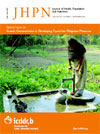
|
The Journal of Health, Population and Nutrition
icddr,b
ISSN: 1606-0997
EISSN: 1606-0997
Vol. 32, No. 2, 2014, pp. 249-260
|
 Bioline Code: hn14028
Bioline Code: hn14028
Full paper language: English
Document type: Research Article
Document available free of charge
|
|
|
The Journal of Health, Population and Nutrition, Vol. 32, No. 2, 2014, pp. 249-260
| en |
Determinants of Early Initiation, Exclusiveness, and Duration of Breastfeeding in Uganda
Bbaale, Edward
Abstract
Breastfeeding practices in Uganda are contrary to the best practice recommended by World Health Organization
(WHO). Only six in 10 Ugandan children below the age of six months are exclusively breastfed. This
paper investigated the determinants of breastfeeding practices in Uganda. Using the Uganda Demographic
and Health Survey (UDHS) of 2006, we employed probit and Cox’s regression techniques as well as the
Kaplan-Meier survival functions during the analysis. On average, 56% and 46% initiated breastfeeding
in the first hour and practised exclusive breastfeeding respectively while 25%, 50%, and 75% terminated
breastfeeding at 18, 24, and 26 months respectively. The mean number of months of breastfeeding was
14.1, and the maximum was 40. Hospital delivery increased the probability of early initiation and exclusive
breastfeeding by 4-5% (p<0.01) and 7-8% (p<0.01) respectively. Prenatal care increased the probability of
early initiation and exclusive breastfeeding by 6-7% (p<0.05) and 5-7% (p<0.05) respectively. Birth intervals
less than 24 months increased the risk of early termination of breastfeeding by 19% (p<0.01). Hospital
delivery and prenatal care should be made a priority, and mothers should be encouraged to adopt higher
birth intervals.
Keywords
Breastfeeding duration; Exclusive breastfeeding; Uganda
|
| |
© Copyright 2014 - The Journal of Health, Population and Nutrition
Alternative site location: http://www.jhpn.net
|
|
